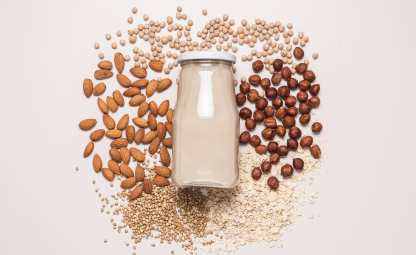Picture this: Over 80% of Indians are grappling with a protein deficiency epidemic. Yes! You read it right. But why? It's all in the plate - our reliance on carb-heavy staples like roti and rice leaves us short on vital protein, particularly for vegetarians. It's a nutritional puzzle begging to be solved. Join us as we unravel the mystery of protein with expert tips tailored specifically for vegetarians to conquer their daily protein requirements.
Why Protein Matters
Protein is a crucial building block for our body. It plays a vital role in:
- Muscle repair and growth: Protein helps build and repair tissues, essential for muscle function and recovery.
- Immune function: Protein is needed to produce antibodies that fight off infections and keep us healthy.
- Enzyme activity and hormone production: Protein is involved in various bodily processes like digestion and metabolism.
- Healthy hair, skin, and nails: Protein is a component of these tissues, promoting their health and strength.
Unlike carbohydrates and fats, our bodies can't store excess protein. Therefore, it's crucial to consume enough protein daily.
How Much Protein Do You Need?
The amount of protein you need depends on factors like age, weight, and activity level. As a general guideline:
- Sedentary adults: Aim for at least 0.8 grams of protein per kilogram of body weight per day.
- Active individuals: You may need 1.2 to 1.8 grams per kilogram of body weight for muscle building.
You can track your protein intake using apps or websites to ensure you're meeting your needs.
Signs of Protein Deficiency
While tracking is ideal, here are some signs you might not be getting enough protein:
- Muscle weakness
- Fatigue
- Brittle hair and nails
- Slow recovery from injuries

If you experience these symptoms, consider reevaluating your diet and incorporating more protein sources.
Vegetarian Protein Powerhouses
While some might believe vegetarians struggle to get enough protein, there are abundant plant-based options:
- Legumes and lentils: Excellent protein sources with varieties like moong dal, toor dal, and rajma offering diverse nutrients.
- Nuts and seeds: Almonds, peanuts, sunflower seeds, and chia seeds are protein-rich and easily incorporated into meals. Remember portion control as they are also high in calories.
- Dairy (for lacto-vegetarians): Milk, cheese, paneer, and yoghurt are significant protein sources. Plant-based alternatives like soy milk are options for vegans.
- Soy products: Tofu and tempeh are versatile protein sources, adding texture and flavour to various dishes.
- Whole grains: Quinoa, amaranth, and wild rice offer protein alongside other nutrients. However, they shouldn't be your primary source due to lower protein content compared to other categories.
Complete vs. Incomplete Proteins:
You may hear about "complete" and "incomplete" proteins. Here's the breakdown:
- Complete proteins: Contain all nine essential amino acids your body needs. Examples include animal-based proteins like meat, eggs, and dairy.
- Incomplete proteins: Most plant-based proteins lack one or more essential amino acids in sufficient amounts.
However, vegetarians can achieve a complete protein profile through protein complementation. This means combining different plant-based protein sources that complement each other's amino acid profile. For example, dal (low in methionine and cysteine) with rice (low in lysine) creates a complete protein together.
Bioavailability:
Bioavailability refers to how easily your body absorbs protein. Generally, animal-based proteins have higher bioavailability than plant-based ones. However, soaking, sprouting, and proper cooking of legumes and nuts can improve their bioavailability.
Protein Supplements: Necessary or Not?
Protein is an essential nutrient that our body needs to function properly. It is a building block for muscles, bones, skin, and other tissues. For most people, getting enough protein from a well-balanced diet is usually sufficient. However, some individuals may find it difficult to consume enough protein in their diet due to a variety of reasons such as dietary restrictions, allergies, or personal preferences.
In such cases, supplements can be a useful alternative to meet their daily protein requirements. Protein supplements are convenient and easy to consume, and they come in a variety of forms such as powders, bars, and shakes. Two popular options for protein supplements are whey protein and plant-based protein supplements.
Whey protein is a by-product of cheese production and is derived from milk. It is a complete protein that contains all the essential amino acids required by the body. The body easily absorbs whey protein supplements and can be useful for individuals looking to build muscles or recover from exercise.
Plant-based protein supplements are derived from various sources such as soy, peas, rice, and hemp. They are a good alternative for individuals who follow a vegan or vegetarian diet or those who have lactose intolerance or milk allergies. Plant-based protein supplements are also suitable for individuals who are looking for a sustainable and environmentally friendly protein source.
It is important to note that protein supplements should not be used as a replacement for a well-balanced diet. They should be used to supplement your diet and not as a primary source of protein. Always consult with a healthcare professional before adding supplements to your diet.

Easy Protein Hacks for Everyday Meals
Small dietary modifications can significantly enhance protein intake without undue complexity.
- Add soy or chickpea flour to your chapati dough.
- Sprout lentils before cooking to increase protein content.
- Substitute rice with quinoa in some meals.
- Include legumes in soups and salads.
- Add peanut powder or ground nuts to curries.
- Snack on yoghurt or paneer.
- Enhance yoghurt or smoothies with nuts and seeds.
- Opt for paneer dishes when ordering restaurant starters.
Embracing these culinary adjustments fosters a sustainable approach to meeting daily protein needs.
Conclusion
Navigating the terrain of vegetarian protein consumption need not be daunting. By cultivating awareness, adopting prudent dietary practices, and incorporating diverse protein sources into meals, vegetarians can easily surmount the protein deficit challenge. With these informed strategies and practical tips, achieving optimal health and functioning through adequate protein intake becomes feasible and gratifyingly attainable.






